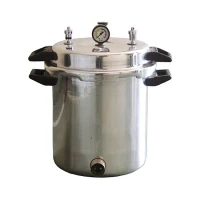
Scientech Autoclave R- 19120315
The Scientech Autoclave is a type of laboratory or medical autoclave used for sterilization. Autoclaves use high-pressure steam to kill bacteria, viruses, fungi, and spores on various materials, making them essential in both laboratory settings and medical environments.
Key Features:
1. Sterilization Chamber: The main compartment where items are placed for sterilization.
2. Control Panel: Set parameters like temperature, pressure, and duration.
3. Safety Features: These might include pressure and temperature sensors, automatic shut-off mechanisms, and safety valves.
4. Heating Mechanism: Generally includes a steam generator to produce the necessary steam.
5. Drying Cycle: Some models feature a drying cycle to remove excess moisture from items after sterilization.
Common Models and Features:
- Class N Autoclaves: Basic models suitable for sterilizing wrapped and unwrapped items.
- Class B Autoclaves: Advanced models that offer higher efficiency and are capable of sterilizing complex loads.
Maintenance and Operation Tips:
1. Regular Cleaning: Ensure the chamber and components are regularly cleaned to avoid contamination.
2. Calibration: Timely calibrate the autoclave to verify that it maintains accurate temperature and pressure settings.
3. Inspect Seals: Check door seals and gaskets for wear and tear.
4. Record Keeping: Maintain logs of sterilization cycles and maintenance activities for regulatory compliance and troubleshooting.
